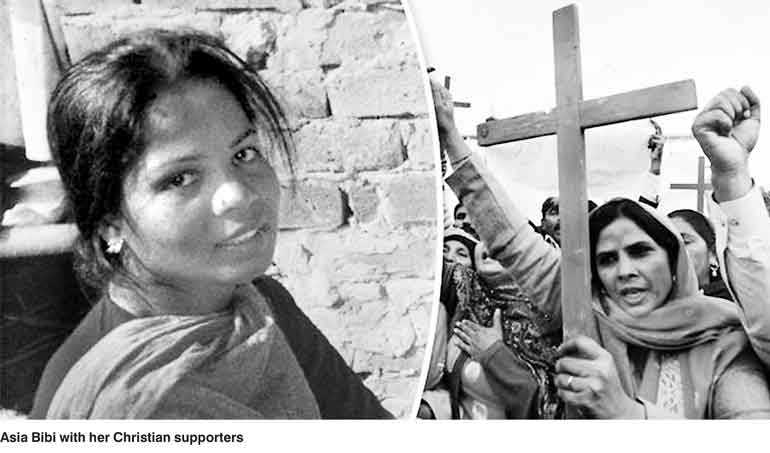Tuesday Feb 24, 2026
Tuesday Feb 24, 2026
Saturday, 3 November 2018 00:10 - - {{hitsCtrl.values.hits}}

Pakistan is currently witnessing widespread violence following the Supreme Court’s acquittal of a Christian woman, Asia Bibi, who was previously sentenced to death by lower courts for blasphemy.
For the third day in succession from 30 October, when the acquittal was announced, schools have remained closed across the country, and streets blocked by angry protesters belonging to the Islamic radical Tehreek-e-Labbaik Pakistan (TLP).
Anticipating such a ruling, TLP held countrywide protests on 14 October and warned that the judges would meet a “horrible end” if Bibi was released.
“Any judge who acquits Asia must be killed,” TLP patron Pir Afzal Qadri told a public gathering the day the Supreme Court was reading Bibi’s case.
“Even the State should kill him because he has become an apostate by releasing her. Earlier, based on my fatwah, Iqbal Bhatti (a High Court judge who had released two 14-year-old Christian boys Salamat Masih and Rehmat Masih, in 1997 in a frivolous blasphemy charge] was killed by a lion, Ahmed Sher Niazi. Now I give the same fatwah [for these Supreme Court judges],” Qadri said.
Imran’s tough stand
But prior to leaving for China, Prime Minister Imran Khan warned the rioters that all steps would be taken to put them down, as he considers the violence an “anti-national’ act in the context of the financial crisis Pakistan is undergoing. And more importantly, he considers it an “anti-Islamic act” as the violence is in contradiction with the Medina Charter propounded by Prophet Mohamman himself in AD 622.
Interestingly, the Supreme Court, the Prime Minister and the lawyer representing Asia Bibi had used Islamic principles to justify their respective stands as the case was Islamic and the opposition was coming from Islamic fundamentalists.
The apex court bench said in its ruling that the blasphemy charge had been leveled without following Islamic principles and was therefore null and void. Prime Minister Imran Khan said that unleashing violence to win a point; threatening to kill judges who delivered the verdict; questioning the religious affiliation of the Army Chief and asking soldiers to mutiny; are all repugnant to the Medina principles.
Clause 47 of the Medina Charter says that no quarter should be given to any injustice or wrong-doing. Clause 25 says that freedom is guaranteed to each community to practice its own religion. The Prophet had proclaimed Medina as a sacred sanctuary (haram) where violence of any kind was prohibited.
False accusation
 The panel of three Supreme Court judges ruled that Bibi was “wrongly” accused by two sisters with the help of a local cleric, based on “material contradictions and inconsistent statements of the witnesses, which cast a shadow of doubt on the prosecution’s version of facts”.
The panel of three Supreme Court judges ruled that Bibi was “wrongly” accused by two sisters with the help of a local cleric, based on “material contradictions and inconsistent statements of the witnesses, which cast a shadow of doubt on the prosecution’s version of facts”.
“Furthermore, the alleged extra-judicial confession was not voluntary but rather resulted out of coercion and undue pressure as the appellant was forcibly brought before the complainant in the presence of a gathering, who were threatening to kill her. As such, it cannot be made the basis of a conviction. Therefore, the appellant being innocent deserves acquittal,” the judges said.
While acknowledging that blasphemy is a “serious offense,” Justice Asif Saeed Khosa wrote that “the insult of the appellant’s religion (Christianity) and religious sensibilities by the complainant party and then mixing truth with falsehood in the name of the Holy Prophet Muhammad (peace be upon him) were also not short of being blasphemous.”
Coming down strongly on fanatic vigilantism, the bench comprising Chief Justice Mian Saqib Nisar and Justices Khosa and Mazhar Alam Khan Miankhel said: “Blasphemy is abhorrent and immoral besides being a manifestation of intolerance, but at the same time a false allegation regarding commission of such an offence is equally detestable besides being culpable.”
“If our religion of Islam comes down heavily upon commission of blasphemy then Islam is also very tough against those who level false allegations of a crime.”
“It is, therefore, for the State of the Islamic Republic of Pakistan to ensure that no innocent person is compelled or constrained to face an investigation or a trial on the basis of false or trumped up allegations regarding commission of such an offence,” the judges said.
The Chief Justice ended the ruling by citing the following hadith (saying) of Prophet Muhammad: “Beware! Whoever is cruel and hard on a non-Muslim minority, or curtails their rights, or burdens them with more than they can bear, or takes anything from them against their free will; I (Prophet Muhammad) will complain against the person on the Day of Judgment.” (Abu Dawud)
Two conflict versions
There were two conflicting versions of the case against Asia Bibi.
According to the accuser, cleric Muhammad Salaam, on the afternoon of 14 June 2009, Asia was picking berries in the fields of Sheikhupura along with about 20 other female workers. She started speaking against the Qur’an and Prophet Muhammad. She had compared Jesus with Prophet Mohammad and asked if the latter did anything to save mankind.
Following this, an “assembly” of clerics and village elders thoroughly investigated the matter for five days. At the end, Asia Bibi “confessed” to making blasphemous statements before this “assembly” and sought “pardon”. But after the extrajudicial confession, she was handed over to the police.
The then Punjab Governor, Salmaan Taseer, went to meet her in prison and had her sign a clemency appeal after Pope Benedict XVI appealed for her pardon. But fundamentalists said that supporting a person suspected of blasphemy is also blasphemy.
This resulted in Taseer’s being gunned down by his own security guard Mumtaz Qadri in January 2011. Later, the Christian Minister in the Federal Cabinet, Shahbaz Bhatti, was also gunned down by Tehreek-e-Taliban for supporting Bibi and for advocating that Pakistan’s blasphemy laws be amended.
In October 2014, the Lahore High Court upheld the decision of the trial court to send Bibi to the gallows.
But as per another version of the so-called blasphemous act, while Bibi was working in the fields, she had brought water for her two female co-workers who were sisters. But the co-workers refused to accept water telling her that she was a “Christian,” an untouchable. Hot words were exchanged.
Accuser Salaam’s lawyer, Ghulam Mustafa Chaudhry, said that Asia Bibi did exactly what the Christians of Spain did against the Muslims hundreds of years ago, namely utter blasphemous anti-Islamic words to insult the Muslims.
The lawyer accused Bibi of being a Christian preacher out to defame the Muslims. But Bibi said that she was illiterate and therefore could not be a “Christian preacher”.
Justice Khosa said that it was possible that the blasphemous words that Asia Bibi was accused of uttering were actually made by the lawyer who drafted the complaint against her. He also stated that the witnesses and the complainant adulterated the truth by removing that part of the incident from their testimony which was not going in their favour.
He then then said: “All concerned would have certainly done better if they had paid heed to what Almighty Allah has ordained in the Holy Qur’an: ‘O you who have believed, be persistently standing firm for Allah, witnesses in justice, and do not let the hatred of a people prevent you from being just. Be just, that is nearer to righteousness. And fear Allah; indeed, Allah is acquainted with what you do.’ (Surah Al-Ma’idah: verse 8). ‘So follow not [personal] inclination, lest you not be just. And if you distort [your testimony] or refuse [to give it], then indeed Allah is ever, with what you do, acquainted.’” (Surah An-Nisa: verse 135).
Khosa also criticised Bibi’s accusers for violating a covenant made by Muhammad with Christian monks on Mount Sinai in 628.
“The promise made was eternal and universal and was not limited to St. Catherine alone,” he wrote. “The rights conferred by the charter are inalienable and the Holy Prophet Muhammad (peace be upon him) had declared that Christians, all of them, were his allies and he equated ill treatment of Christians with violating God’s covenant.”
“It is noticeable that the charter imposed no conditions on Christians for enjoying its privileges and it was enough that they were Christians,” he wrote.
“They were not required to alter their beliefs, they did not have to make any payments and they did not have any obligations. The charter was of rights without any duties and it clearly protected the right to property, freedom of religion, freedom of work, and security of person.”
‘Open Doors’ ranks Pakistan No. 6 on its list of 50 countries where it’s hardest to be a Christian.